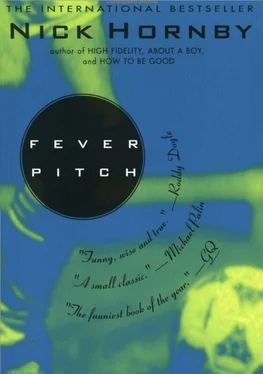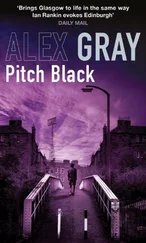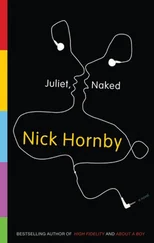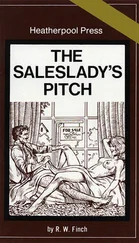Is it really a coincidence, blind luck, that I have not yet found myself in an unavoidable match-missing position in over a decade as a wage-earner? (Even my superiors at the Far Eastern company, usually completely mystified by the compulsion of a social life, were in no doubt that Arsenal came first.) Or has my obsession shaped and guided my ambition? I would prefer to think not, of course, because if it has then the implications are alarming: all those options that I thought were still mine during my teenage years have in that case never existed, and the Stoke game in 1968 effectively prevented me from becoming an entrepreneur or a doctor or a real journalist. (Like many fans, I have never even contemplated becoming a sports-writer. How could I report on Liverpool versus Barcelona when I would rather be at Highbury to watch Arsenal against Wimbledon? Being paid a lot of money to write about the game I love is one of my darkest, clammiest fears.) I prefer to think of my freedom to go to Highbury whenever there is a game as a fortuitous side-effect of my chosen path, and leave it at that.
ARSENAL v NEWCASTLE
15.4.89
There were rumours emanating from those with radios, but we didn’t really know anything about it until half-time, when there was no score given for the Liverpool-Forest semi-final, and even then nobody had any real idea of the sickening scale of it all. By the end of our game, a dull, distracted 1-0 win, everyone knew there had been deaths. And a few people, those who had been to Hillsborough for the big occasions, were able to guess whereabouts in the ground the tragedy had occurred; but then, nobody who runs the game has ever been interested in the forebodings of fans.
By the time we got home it was clear that this wasn’t just another football accident, the sort that happens once every few years, kills one or two unlucky people, and is generally and casually regarded by all the relevant authorities as one of the hazards of our chosen diversion. The numbers of dead rose by the minute—seven, then a score, then fifty-something and eventually ninety-five—and you realised that if anybody had even a shred of common sense left available to them, nothing would ever be the same again.
It is easy to understand why bereaved families wish to see officers from the South Yorkshire police brought to trial: their error of judgement was catastrophic. Yet, though it is clear that the police messed up badly that afternoon, it would be terribly vengeful to accuse them of anything more than incompetence. Very few of us are unfortunate enough to be in a position where our professional mistakes kill people. The police at Hillsborough were never able to guarantee safety, however many gates they did or didn’t open; no police force at any football ground in the country could do that. It could have happened anywhere. It could have happened at Highbury—on the concrete steps leading out of the North Bank down to the street, maybe (and it doesn’t require a very elaborate fantasy to imagine that); or it could have happened at Loftus Road, where thousands of fans can only gain access to the away end through a coffee bar . And there would have been an enquiry, and newspaper reports, and blame attached to the police, or stewards, or drunken fans, or somebody. But that wouldn’t have been right, not when the whole thing was based on such a ludicrous premise.
The premise was this: that football stadia built in most cases around a hundred years ago (Norwich City’s ground, fifty-eight years old, is the youngest in the First Division) could accommodate between fifteen and sixty-three thousand people without those people coming to any harm. Imagine the entire population of a small town (my own home town has a population of around fifty thousand) trying to get into a large department store, and you will have some idea of the hopefulness of this. These people stood, in blocks of ten or twelve thousand, on steeply banked and in some cases crumbling concrete terracing, modified but essentially unchanged over several decades. Even in the days when the only missiles hurled into the air were flat hats, this patently wasn’t safe: thirty-three people were killed at Burnden Park, Bolton, in 1946 when crush barriers collapsed, and the Ibrox disaster in 1971 was the second to take place there. By the time football became a forum for gang warfare, and containment rather than safety become a priority (those perimeter fences again), a major tragedy became an inevitability. How could anyone have hoped to get away with it? With sixty-thousand-plus crowds, all you can do is shut the gates, tell everyone to squash up, and then pray, very hard. The Ibrox disaster in 1971 was an awful warning that wasn’t heeded: there were specific causes for it, but ultimately what was responsible was the way we watch football, among crowds that are way too big, in grounds that are far too old.
These grounds had been built for a generation of fans that didn’t drive, or even rely on public transport overly much, and so they were placed carefully in the middle of residential areas full of narrow streets and terraced houses. Twenty or thirty years after the catchment areas began to expand dramatically, and people started travelling from ten or twenty or fifty miles away, nothing has changed. This was the time to build new stadia, out of town, with parking facilities and improved safety provisions; the rest of Europe did, and as a consequence the grounds in Italy, Spain, Portugal and France are bigger, better and safer, but typically, in a country whose infrastructure is finally beginning to fall apart, we didn’t bother. Here, tens of thousands of fans walk up narrow, winding underground tunnels, or double-park their cars in tiny, quiet, local streets, while the relevant football authorities seem content to carry on as if nothing at all—behaviour, the fan base, methods of transport, even the state of the grounds themselves, which like the rest of us start to look a bit tatty after the first half-century or so—had changed. There was so much that could and should have been done, and nothing ever was, and everyone trundled along for year after year after year, for a hundred years, until Hillsborough. Hillsborough was the fourth post-war British football disaster, the third in which large numbers of people were crushed to death following some kind of failure in crowd control; it was the first which was attributed to something more than bad luck. So you can blame the police for opening the wrong gate at the wrong time if you like, but in my opinion to do so would be to miss the point.
The Taylor Report, famously and I think rightly, recommended that every football ground should become all-seater. Of course this brings with it new dangers—a possible repeat of the Bradford fire disaster, for example, where people died because highly flammable rubbish had been allowed to accumulate under the stands. And seats in themselves are not going to eliminate hooliganism, and could, if the clubs are very stupid, exacerbate it. Seats can be used as weapons, and long rows of people can obstruct police intervention if trouble does break out, although all-seaters should give clubs greater control over who occupies which part of the ground. The real point is that the likelihood of dying in the way that people at Ibrox and Hillsborough died will be minimised if the clubs implement Lord Justice Taylor’s recommendations properly, and that, as far as I can see, is all that matters.
At the time of writing, the Taylor Report is prompting noisy dissent among fans and among some clubs. The problems are manifold. Changing the stadia to make them safe will prove expensive, and many clubs haven’t got the money. In order to raise the money, some of them will be charging much higher entrance fees, or introducing schemes like the Arsenal and West Ham Bonds, which may mean that many young working-class males, the traditional core of support, will be excluded. Some fans want to continue standing. (Not, I think, because standing is an inherently superior way of watching a game—it isn’t. It’s uncomfortable, and anyone under six feet two has a restricted view. Fans worry that the end of terrace culture will mean the end of noise and atmosphere and all the things that make football memorable, but the all-seated ends at Ibrox make more noise than the Clock End and the North Bank put together; seats in themselves do not turn football grounds into churches.) All ground capacities will be reduced, some to below current average attendance figures. And some clubs will have to close down altogether.
Читать дальше











